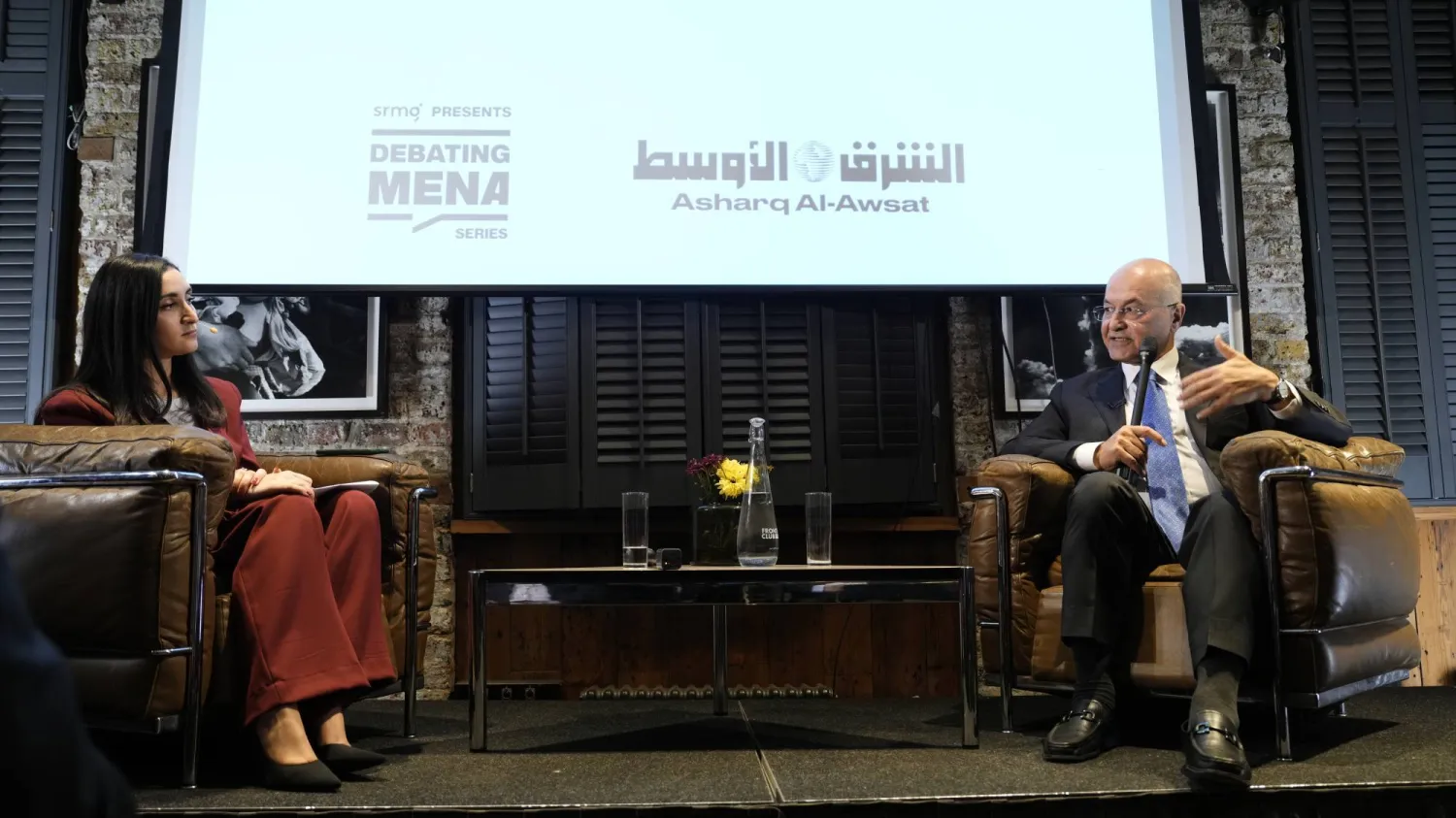Former Iraqi President Barham Salih warned that the Middle East is on the edge of a crisis but remains hopeful, citing growing international efforts to stop the ongoing war.
He also pointed to Iraq’s fragile situation, with local groups becoming more involved in the conflict.
Speaking at a panel in London organized by Asharq Al-Awsat and moderated by journalist Najlaa Habriri, Salih—who was president from 2018 to 2022—shared his thoughts on key political and historical events in Iraq and the region.
This event was the first in a series of talks with policymakers, business leaders, and academics hosted by Asharq Al-Awsat as part of SRMG’s initiatives.
A New Face for the Middle East
Salih believes the Middle East is entering a dangerous new phase, with the current conflict giving the region a “new face.”
“We’re witnessing a great tragedy. The destruction in Gaza is now spreading to Lebanon,” Salih said.
He expressed concern over growing anger in the Arab world due to repeated cycles of violence but stressed the need for change.
“We must move away from this crisis and find new ways to help the region grow and stabilize,” he said.
Salih called for bold action, urging leaders to cool the rising tensions and prevent further loss of innocent lives. He also shared cautious optimism after recent talks with policymakers in Baghdad and Washington, noting efforts to calm the situation.
“I hear there’s serious work underway to de-escalate, and while I can't guarantee success, I still have hope for a ceasefire,” he said.
Salih expected a temporary halt to fighting, allowing people to return home, but emphasized the need for fresh thinking to end the conflict.
“We can't go back to the old ways without addressing the root causes of violence,” he added.
Despite the challenges, Salih acknowledged ongoing global efforts, especially from Washington, to reduce the war’s catastrophic impact on the region.
Iraq at the Heart of the Storm
For the former Iraqi president, Iraq is “the best example of the consequences of violence,” and now the country faces a tough situation, caught between conflicting interests.
However, Salih is confident that “the decision to go to war in Iraq lies solely with the state,” not with the various groups pushing for escalation.
Salih noted that Iraqis don’t just offer sympathy—they provide real support, as shown with the Palestinians and now the Lebanese. He pointed to the flow of humanitarian aid from both government and civilian sources, stressing that in Iraq, there is widespread support for just causes.
Despite this, Salih warned that Iraq’s own challenges “make it clear that the country should avoid getting involved in more conflict.”
While Iraq’s stability is fragile, he believes it can be maintained if the country steers clear of the ongoing escalation.
Salih reflected on Iraq’s history of violence and conflict since 1958 but expressed optimism after meeting with Iraqi leaders.
“I was in Baghdad two months ago, and the main topic was clear: either we become a strong state, or we don’t. There’s no middle ground,” he said.
Salih insisted that “the decision for war or peace is a national one, not something that can be decided by any group or movement.”
He voiced concern that some factions are pushing Iraq into deeper involvement in the regional conflict, warning that this could lead to broader, more destructive consequences.
“We must be careful to avoid being dragged into a wider regional war. Iraq needs time to heal,” he noted.
While Iraq holds deep support for the Palestinian cause, Salih emphasized that “slogans won’t solve anything. The solution is in taking concrete steps to help Palestinians and Lebanese, both of whom are suffering from the conflict.”
“Anyone seeking a better Middle East must firmly support the Palestinians' right to a state and their rights as a people,” he affirmed.
US Withdrawal from Iraq
“Yes, there’s an agreement,” Salih said, referring to discussions between Washington and Baghdad on the future of the US-led international coalition in Iraq.
He suggested the topic was likely addressed during Prime Minister Mohammed Shia al-Sudani’s recent meeting with US Secretary of State Antony Blinken in New York.
An announcement about shifting the international coalition’s mission and gradually withdrawing US combat forces was expected, but Salih noted the recent escalation in Lebanon may have delayed it.
“Talks are ongoing, but nothing is finalized,” he added.
Salih acknowledged the key role US forces played in defeating ISIS, but emphasized that countries, including Iraq, seek full sovereignty.
While many believe Iraq’s stronger military means foreign troops are no longer needed, Salih disagrees. He argued that Iraq still requires intelligence support, especially for counterterrorism operations.
He pointed to reports of potential terrorist resurgence in the region, particularly in Syria.
“There are tens of thousands of angry individuals in the Middle East who could become a ticking time bomb, threatening Iraq and its neighbors. Just look at what’s happening in Idlib and the reappearance of Abu Mohammad al-Jolani,” said Salih.
He stressed that the risks are clear, even without specific intelligence.
“This is a global challenge, not just Iraq’s,” stressed Salih.
“I’m proud of the progress made by Iraqi forces, but there’s still a need for intelligence-sharing, especially in air operations,” he affirmed.
Barham Salih to Asharq Al-Awsat: Region Nearing Crisis…Iraq Best Witness to Violence

Barham Salih with Asharq Al-Awsat colleague Najlaa Habreiri (Asharq Al-Awsat)

Barham Salih to Asharq Al-Awsat: Region Nearing Crisis…Iraq Best Witness to Violence

Barham Salih with Asharq Al-Awsat colleague Najlaa Habreiri (Asharq Al-Awsat)
لم تشترك بعد
انشئ حساباً خاصاً بك لتحصل على أخبار مخصصة لك ولتتمتع بخاصية حفظ المقالات وتتلقى نشراتنا البريدية المتنوعة







